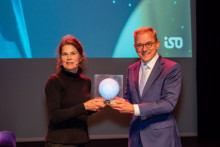Ethical issues regarding drones is the focal point of the workshop, which is open to anybody and will be guided by teams consisting of UT and Saxion lecturers, including professor Peter-Paul Verbeek. The event is part of a Space53 ‘Cluster and Network project’, involving both the University of Twente and Saxion and focused on building a network around unmanned aerial systems alias drones.
Space53
Space53 is a foundation officially opened a year ago and belonging to Novel-T. Located at the Twente Technology Base, it is aiming to be a frontrunner in the field of unmanned systems with a special focus on drones. It is a public-private partnership that brings together various stakeholders from the region, including the University of Twente, Saxion University of Applied Sciences, the municipality of Enschede and a number of companies such as Clear Flight Solutions and Demcon.
An economic opportunity or a safety threat?
‘We are starting this project with a readiness scan for drones,’ says Marc Sandelowsky, the director of Space53 and a UT alumnus. ‘It is already possible to assess the technological readiness, but what was missing were the other parts of market readiness: business, societal, ethical and legal aspects. In the Netherlands, drones are often not regarded as an economic opportunity, but as a safety threat. Besides legislation, there is the question of societal feasibility. Is society ready to accept this new technology? How about the noise drones make, for example? Is it acceptable for people? And is people’s acceptance different if a drone is used by the police searching for a missing child or if it’s used for delivering beer?’
Which is why it’s important to have open discussions about ethical guidelines for drones and other new technologies, according to Sandelowsky: ‘Robots, which used to be confined to factories, are now going outside and will mingle with the public. That comes with technical and societal challenges. It’s great that it’s working, but is it something that society would like to have? The use of drones is possible now, but we need to discuss its possible ethical issues before we jump into the opportunity. Take the internet, for example. When it started, everything was possible. Now we see more and more legislation emerging to protect our privacy and keep us safe.’
Space for testing
The workshop and the related ‘Cluster and Network project’ are not the only examples of collaboration between Space53 and the UT. ‘We offer facilities to the UT community. The university is developing robots for the outside and we offer the space and licenses to safely test them,’ says the Space53 director. ‘Secondly, we are developing innovation projects together within various consortia. We need joint projects and general awareness in order to stimulate economic development around drones.’ Which is precisely what Space53 is after, adds Sandelowsky. ‘We want to strengthen the economic structure of the region. And there is a lot of unique knowledge and space for development of unmanned systems.’







